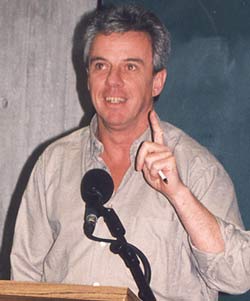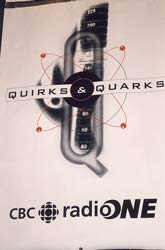|
|||||||||||||||||||||||||||||
|
|
|||||||||||||||||||||||||||||
|
|
|
| | VOLUME 32, NUMBER 17 | WEDNESDAY, MAY 8, 2002 | ISSN 1199-5246 | |
|
|
||||||
|
|
Moderator and "Quirks & Quarks" host Bob McDonald
If the audience didn't recognize the face of Bob McDonald, affable host of CBC Radio's "Quirks & Quarks", they certainly knew him by his engaging voice. In March he moderated a panel discussion at York entitled, "First Contact: What If...?", the last in the University's popular seminar series "The Quest for Contact: In Search of Extraterrestrial Life".
In her introduction, President Lorna R. Marsden described York alumnus McDonald as "an enthusiastic educator" and "a great communicator about science". "This is a great finale to the series, to have it broadcast on 'Quirks & Quarks'", she said before rejoining the audience.
Then McDonald posed some questions to the panellists. Here are some excerpts:
McDonald: Let's assume we will make contact with extraterrestrials relatively soon. How would that first contact affect us? How would it change our perceptions of who we are and our place in the universe? How would we react to our new acquaintances?
Alcock: I think it would lead to a big change. We would realize we're not alone. But the change may last for only five minutes - or longer, depending on what people do with that realization, for instance if they start to look at their philosophical beliefs about society....
McDonald: What are the main legal implications if aliens contacted us?
Sterns: In a new relationship we have to establish new rules by which we enter and live with that relationship. Right now at the SETI Institute (Search for Extra-Terrestrial Intelligence) they are discussing how to disseminate information in the event of a verified ET contact, as well as how to verify the contact. We need to do this in a responsible manner so that there is not hysteria, and so that the information discussed is accurate.... We wonder, will we have a relationship with intelligent beings outside of our Earth? We have a great deal of difficulty in comprehending the different cultural aspects of our own world! It is important to consider basic philosophical, jurisprudential issues....
McDonald: What would you want to know about these extraterrestrials, as a scientist?
Smolin: For sure, about their music, poetry, art - and later, their science. Science is interesting, but when you meet a scientist from another country, the first thing you do is make friends, then you talk about relationships, poetry, art, travel.
McDonald: But wouldn't you be dying to know "what drives this spacecraft"?
Smolin: (to laughter) I don't even know how radios work, personally! I would be concerned about them, because they would have come a long way and they would be tired. First things first: you would ask "How are you doing?", and "What drives you?", not "What drives your spaceship?"
McDonald: Why do you think "first contact" is such a popular theme in science fiction? Sawyer: Well, it's about doing thought experiments with the human condition, it's about the responses of all human beings. McDonald: Imagine a researcher at SETI has discovered a repeat, organized pattern in a signal that just can't be anything but a message from an extraterrestrial encounter. What happens next? Sterns: SETI's protocol* will come into action and the news will be disseminated to the approximately 70 persons within the SETI community, including radio astronomers, sociologists and other experts from other disciplines, who will deal with it. Initially, they will be looking for verification, checking that it is not a hoax. McDonald: Do you think anyone at SETI would try to keep the news quiet? Sterns: No. They are anxious to make contact and hopeful that they will find something. They devote their life to their research. They would be excited. They have a protocol in place so that nobody panics. Of course, there are amateur astronomers who might get the signal first. We are hoping that they'll work with the professionals. McDonald: Once the signal is verified, how will it be given out to the public? Sterns: That is still in a state of flux. We have lawyers and scientists all working on this and now we have a second-stage draft protocol. The consensus is that discussions should begin today to work out such variables as, is it contact by radio or are extraterrestrials imminently here? Is it an intended signal or a serendipitous one? The experts will have to weigh all those things up. Verification, though is the most important thing. McDonald: How would people translate the signal? There would be a language problem. Sawyer: It is one of the fascinating questions. We have always assumed there will be certain laws of physics, principles of chemistry and mathematical notational symbols that would be shared across any range of intelligent life forms. But we have no reason to believe that empirically. We think dolphins are intelligent but they have never developed binary symbols; and we can't talk to a chimpanzee in chemical symbols yet they are clearly animals that might have interesting things to say. I think we should concentrate not on the message but on the mere fact that we are not alone, that there is sophisticated life out there. The medium is the message. The fact that we receive a SETI signal is fundamentally the most important content it has.
McDonald: Even if the message is just "hello", how will that affect us? Alcock: We will want to know when the signal was sent, and can we answer it. We may be at such a distance from it (its origin) that it would be one event in a lifetime, and people would talk about it for the rest of their lives. Some might wonder if it is a hoax; others might say they do believe it happened, and then what does that do to our philosophy? Smolin: There will be those who have an agenda, because their religion will demand that they convert and save the souls of these intelligent beings. McDonald: What do you think a message might say? Alcock: It would be simple, something to tell us there is intelligence out there.... Perhaps a mathematical symbol. Sterns: It might include a simple and a complex message, a mathematical symbol. Sawyer: They will want the message to be read. Given that, I think they would include something that is important to them. Smolin: Wouldn't it be wonderful if it is something we wouldn't be expecting?... It seems to me...they would send a signal because they want to know if anyone else is there. Then they might say, "We would like you to come to us and we very much hope that you have figured out space travel better than we have."(laughter) Space travel is expensive. Maybe we'll be like two teenagers in different countries on the telephone: unable to get the plane fare together. McDonald: Here is a different scenario. The Hubble Telescope sees...the rocket drive of a spacecraft as it approaches Earth. What are the odds of spacecraft coming here? Smolin: I have no idea...(laughter) I think space is full of life, but the distances are great. Sawyer: Contact by radio signals is much more likely simply because the cost is less. Economics is economics everywhere in the Milky Way. Alcock: There is a certain arrogance here. Why would they come here? What have we got that is so important? I suspect our reaction to contact with them would depend on whether they were coming as tourists or immigrants. Sterns: (If they do land here:) We have the basic principle of equality. We must start with an even playing field. But it would be difficult...when we don't share a common background. McDonald: We are assuming they will be like us. What if they look like cooked cabbage? Sterns: I agree. They might look like bread mould, cats, dogs. They might well be something other than carbon-based...such as something that lives inside a salt crystal.... Sawyer: You are asking for egalitarianism...when we don't even show that to other people on this planet. We have enough food here for six billion people but do we share equally among all of us? If we say to them, "Do as we would like you to do to us", it won't work well if they are demonstrably superior to us. Smolin: I find it hard to imagine why someone would come all this way.... If they choose to visit us the least we can do is offer them hospitality by saying, "Thank-you for coming all this way. What can we do to make you comfortable?" Then we can see what we have in common and can share. Sawyer: They might be here for much the same reason as biologists study rainforest insects. Alcock: We have developed responses to how things look and that affects how we would react. For instance, we have certain responses to baby seals and not to crocodiles. So how we react to extraterrestrials might depend on how they look. If they look like crocodiles we'll have a hard time having a glass of wine with them and relaxing! (laughter) McDonald: But suppose we can't break down the communications barrier at all, yet they are here? Alcock: Then we'll have houseguests that we don't know what to do with! We might feel anxious and threatened, and decide to lock them up to protect ourselves. W
*The SETI Institute's protocol is at these sites, http://seti.planetary.org. The panel discussion was the last in the seminar series, "The Quest for Contact: In Search of Extraterrestrial Life", presented by the Science and Society Program and Bethune College, and sponsored by the Office of the Vice-President Academic and the Division of Humanities. |
|||||
|
|
||||||
|
|
|
| Current Issue | Previous Month | Past Issues | Rate Card | Contact Information | Search |
|

 "Quirks & Quarks" host asks "First Contact: What if...?"
"Quirks & Quarks" host asks "First Contact: What if...?"

